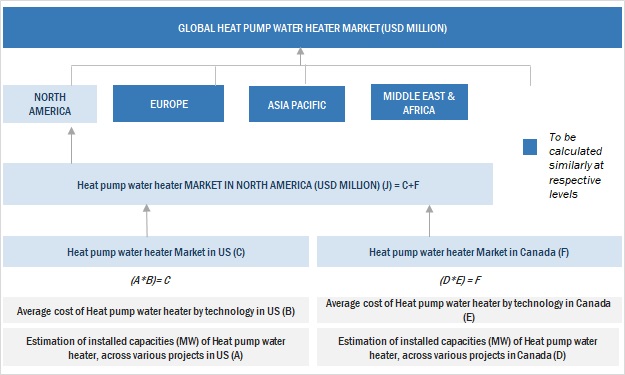
New Revenue Pockets:
The global heat pump water heater market size is projected to reach USD 2.1 billion by 2026 from an estimated value of USD 1.4 billion in 2020, at a CAGR of 6.8%. Factors driving the growth of the heat pump water heater market include the energy efficient technology along with the usage of non conventional sources of energy to heat the water. In addition, supportive regulations and grants for using renewable sources of energy in different applications are also expected to play a key role in the growth of this market during the forecast period.
The heat pump water heaters market is dominated by a few global players, mainly from the North America, Asia Pacific, and Europe. Key players in the heat pump water heater market Midea Group (China), RHEEM Manufacturing Company (US), Daikin (Japan), A.O. Smith Corporation (US), Bosch Industries (Germany), and Ingersoll Rand (US), etc. and other players such as Viessmann Group (Germany), NIBE Energy Systems (Sweden), Valliant Group (Germany), Daikin (Japan), Mitsubishi Electric (Japan), Glen Dimplex (Ireland), Stiebel Eltron (Germany), and more.
Download PDF Brochure: https://www.marketsandmarkets.com/pdfdownloadNew.asp?id=22529761
The air source segment is estimated to be the fastest-growing segment of the heat pump water heater market, by type, from 2020 to 2026. Air source heat pump water heater segment is getting a boost during the forecast period due to the increased awareness about the usage fo renewable technology in water heating in residential, commercial, and residential sector. Additionally, supportive grants, incentives, and regulations are also helping this market to grow at a significant pace.
The 10–20kW segment of the heat pump water heater market, by rated capacity, is estimated to grow at a faster rate from 2020 to 2026. Ease of operations owing to their instantaneous water heating capability along with its growing requirement in the residendial sector is driving the growth of the 10–20 kW rated capacity segment of the heat pump water heater market.

The below 500 LT segment of the heat pump water heater market, by storage tank capacity, is estimated to grow at a faster rate from 2020 to 2026. The growth of this segment can be attributed to the ample water provided by below 500 liters heat pump water heater for almost all applications, in the residential sector and small scale commercial building except for a few water-intensive applications.
The R744 segment of the heat pump water heater market, by refrigerant, is estimated to grow at a fastest rate from 2020 to 2026. R744 is the chemical reference for carbon dioxide (CO2) that is used as a refrigerant. It occurs naturally and can be applied as a working fluid in different heating and cooling applications. This refrigerant is nontoxic and non-ozone depleting which is driving the growth for R744 segment of heat pump water heater.
The residential segment is expected to be the fastest growing segment of the heat pump water heater market, by end user, from 2020 to 2026. The market for the segment is growing due to the growing awareness regarding the energy efficiency technology of heat pump water heater. Also the government of various countries such as China and Australia is launching various programs under which its offering rebates or other benefits for the installation of heat pump water heater.
Ask Sample Pages: https://www.marketsandmarkets.com/requestsampleNew.asp?id=22529761
The heat pump water heater market has been segmented, by region, into Europe, North America, Asia Pacific, and South America. The Asia Pacific region is projected to grow at the fastest rate, from 2020 to 2026, followed by North America and Europe. Countries such as China, New Zealand and Australia are the fastest-growing markets in the Asia Pacific region, owing to the increase in the government initiatives to enhance the installation of heat pump water heaters due to its energy efficient technology. China is projected to grow at the highest CAGR from 2020 to 2026. This is mainly due to the increasing investment in technologies that can help it in limiting its carbon footprint and increase the efficient usage of electrical power and heat pump water heaters being one of the most energy efficient technology in water heating, is expected to grow at a significant pace in the near future.


